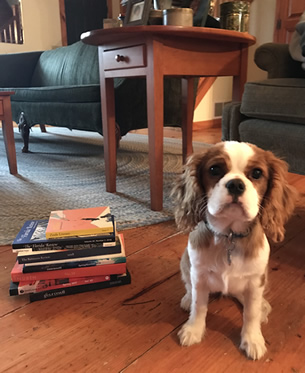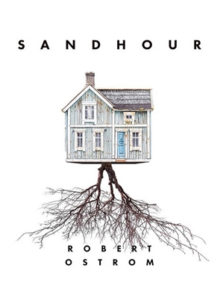 Some of the most popular works of fiction are what I think of as monkey-wrench stories. They’re tales that establish an ordinary, habitual, possibly boring-as-hell situation, then introduce an element that upends everything. When an author throws a monkey wrench into the works, the reader gets to experience the disruption (along with the ensuing stress, struggle, excitement) and then, if the tale leans toward hope, the reader can enjoy the restoration of order or the development of a new order. [Read more…] about Things Not Going According to Plans
Some of the most popular works of fiction are what I think of as monkey-wrench stories. They’re tales that establish an ordinary, habitual, possibly boring-as-hell situation, then introduce an element that upends everything. When an author throws a monkey wrench into the works, the reader gets to experience the disruption (along with the ensuing stress, struggle, excitement) and then, if the tale leans toward hope, the reader can enjoy the restoration of order or the development of a new order. [Read more…] about Things Not Going According to Plans
Happy?
 “A mindful happiness knows, and acknowledges, everything from which it has been excluded or freed. It often has a frame of suffering around it.”
“A mindful happiness knows, and acknowledges, everything from which it has been excluded or freed. It often has a frame of suffering around it.”
—Charles Baxter, “Regarding Happiness”
A Killing Suspense: The Character of Dread in “Something” by Joan Aiken
 My friend Rebecca recently recommended that I check out A Fit of Shivers, a collection of ghost stories by the children’s-book author Joan Aiken. I really enjoyed it. Aiken describes the enchanted, horrifying, and strange with matter-of-fact briskness to disconcerting and wryly humorous effect. I found the tale “Something” particularly arresting. It plays with the experience of dread. Dread, of course, is inherent in spooky tales, right along with fear and surprise. But Aiken doesn’t merely highlight dread in “Something.” She lets the feeling function as the antagonist. [Read more…] about A Killing Suspense: The Character of Dread in “Something” by Joan Aiken
My friend Rebecca recently recommended that I check out A Fit of Shivers, a collection of ghost stories by the children’s-book author Joan Aiken. I really enjoyed it. Aiken describes the enchanted, horrifying, and strange with matter-of-fact briskness to disconcerting and wryly humorous effect. I found the tale “Something” particularly arresting. It plays with the experience of dread. Dread, of course, is inherent in spooky tales, right along with fear and surprise. But Aiken doesn’t merely highlight dread in “Something.” She lets the feeling function as the antagonist. [Read more…] about A Killing Suspense: The Character of Dread in “Something” by Joan Aiken
Resolution
 “You can measure your worth by your dedication to your path, not by your successes or failures.”
“You can measure your worth by your dedication to your path, not by your successes or failures.”
—Elizabeth Gilbert, Big Magic [Read more…] about Resolution
Submitting, Dreaming, Failing, Succeeding
 When I turned forty, my husband, brother, and older sister threw a surprise party for me at Krony’s, a local pizza shop. I remember the event as a jumble of joy: laughter, strewn wrapping paper, the loud antics of seven kids, the pop of a balloon, and a mess of cake and ice cream and pizza crusts. In contrast to the cacophony was something else. A quiet celebration. A piercing thrill. Only the day before, I’d received an acceptance from a literary journal—my first acceptance, after five years of faithful writing. My story “Practical Solution” was to appear in the next issue of Oblong Magazine. I couldn’t have asked for a better birthday present. [Read more…] about Submitting, Dreaming, Failing, Succeeding
When I turned forty, my husband, brother, and older sister threw a surprise party for me at Krony’s, a local pizza shop. I remember the event as a jumble of joy: laughter, strewn wrapping paper, the loud antics of seven kids, the pop of a balloon, and a mess of cake and ice cream and pizza crusts. In contrast to the cacophony was something else. A quiet celebration. A piercing thrill. Only the day before, I’d received an acceptance from a literary journal—my first acceptance, after five years of faithful writing. My story “Practical Solution” was to appear in the next issue of Oblong Magazine. I couldn’t have asked for a better birthday present. [Read more…] about Submitting, Dreaming, Failing, Succeeding
Defend the Castle
 When I was young, around the age of twelve, I’d start my mornings by making a to-do list. I also incorporated a schedule for the tasks. Homework, studying, practicing the violin, reading, “free time,” mealtimes, bedtime: they all got a specified chunk of minutes. I crossed off the goals as I met them. The daily itinerary was ambitious, impossibly so, and it made me perpetually anxious. Not surprisingly, my middle-grade years were pretty miserable. [Read more…] about Defend the Castle
When I was young, around the age of twelve, I’d start my mornings by making a to-do list. I also incorporated a schedule for the tasks. Homework, studying, practicing the violin, reading, “free time,” mealtimes, bedtime: they all got a specified chunk of minutes. I crossed off the goals as I met them. The daily itinerary was ambitious, impossibly so, and it made me perpetually anxious. Not surprisingly, my middle-grade years were pretty miserable. [Read more…] about Defend the Castle
Right Place, Right Time
 The other day, on a mission to gather books that needed to be returned to the library, I waded through my older child’s room, skirting piles of stuffed animals and hopping over scattered markers, colored pencils, Pokémon cards, nail polish, sketchbooks, Littlest Pet Shop figurines, and who knows what else. I found the library books mixed in with some of my girl’s books, on the floor by the shelves. [Read more…] about Right Place, Right Time
The other day, on a mission to gather books that needed to be returned to the library, I waded through my older child’s room, skirting piles of stuffed animals and hopping over scattered markers, colored pencils, Pokémon cards, nail polish, sketchbooks, Littlest Pet Shop figurines, and who knows what else. I found the library books mixed in with some of my girl’s books, on the floor by the shelves. [Read more…] about Right Place, Right Time
A Conversation with My Brother
 My blog has become a good place for me to reflect on my writing and life. But this month, I’m reflecting on someone else’s work—my brother’s. Robert Ostrom is a professor at New York City College of Technology and the author of The Youngest Butcher in Illinois (YesYes Books, 2012) and Ritual and Bit (Saturnalia Books, 2016). Sandhour, his third poetry collection, is coming out next month. I very much admire Robbie’s work, and his steadfast commitment to his craft inspires me. I thought it would be interesting to interview him and ask him a few questions about his latest collection. Here’s our conversation:
My blog has become a good place for me to reflect on my writing and life. But this month, I’m reflecting on someone else’s work—my brother’s. Robert Ostrom is a professor at New York City College of Technology and the author of The Youngest Butcher in Illinois (YesYes Books, 2012) and Ritual and Bit (Saturnalia Books, 2016). Sandhour, his third poetry collection, is coming out next month. I very much admire Robbie’s work, and his steadfast commitment to his craft inspires me. I thought it would be interesting to interview him and ask him a few questions about his latest collection. Here’s our conversation:
MO: Sandhour, your third collection of poetry, is forthcoming from Saturnalia Books on October 15, 2019. Tell me about it. [Read more…] about A Conversation with My Brother
Revise It or Ditch It
 When it comes to keeping up with must-see television, I am way behind. I haven’t even crossed the starting line. Game of Thrones, Mad Men, Big Little Lies, Breaking Bad, Downton Abbey, Sherlock, The Office: I’ve never seen any of these. Someday I’ll catch up. I’d like to experience the golden age of television before I’m in my golden years. [Read more…] about Revise It or Ditch It
When it comes to keeping up with must-see television, I am way behind. I haven’t even crossed the starting line. Game of Thrones, Mad Men, Big Little Lies, Breaking Bad, Downton Abbey, Sherlock, The Office: I’ve never seen any of these. Someday I’ll catch up. I’d like to experience the golden age of television before I’m in my golden years. [Read more…] about Revise It or Ditch It
One Measure at a Time
 This Blog Post has also been featured in Zizzlelit.
This Blog Post has also been featured in Zizzlelit.
Last year, as part of its Tiny Desk Concert series, NPR featured Yo-Yo Ma. The cellist devoted his twelve minutes to discussing J. S. Bach and playing a little of the composer’s music. I loved hearing Yo-Yo Ma perform, but what struck me was something he said. He revealed that Suite No. 1 for Solo Cello, the piece with which he opened, was the first song he’d learned to play. And he learned it when he was four years old.
I marveled at this (four years old!), but he was modest about the accomplishment, explaining that he’d learned the piece “one measure at a time.”
The audience laughed as he demonstrated the inching progress of his practice. One day: one measure. The following day: the next. He emphasized how some practices were easy because a measure—the day’s “homework”—was a repeat of the previous day’s measure. Other times, the measure was different but similar to the one the day before and therefore not too difficult. And then there were harder days with more complicated measures. But still, a measure a day, however challenging, by virtue of its brevity, was doable.
After reflecting on his earliest experiences playing the cello, Yo-Yo Ma confided, “It’s actually not painful to learn something if you do it incrementally.”
These words have stayed with me. They touch on what I’ve learned about myself: that I write best when I write very little.
This isn’t to say that I write for ten minutes, then call it quits. Almost every morning, I sit at my desk for at least three hours. But in these hours, I’ll only strum up four or five hundred words. I usually feel good about them, however. My writing routine—eking out a little over a long spell—doesn’t just keep the pressure manageable, it affords me the luxury of time to tweak, experiment, sit, and think. To add words, cut words, rearrange, and read aloud. To play.
Incidentally, five hundred words is probably the average length of a work of flash fiction. I’ve developed a passion for flashes. The form is aptly named and not just because such stories can be read “in a flash.” So often, the stories, themselves, seem to flash—with an energy that presses against the word-length restraints. With a loosely-tethered power.
A good flash will shimmer.
Though I write flash fiction regularly these days, a decade ago, I didn’t even know the form existed. I regret this. Had I been familiar with flash when I was still teaching high school English, I would have incorporated the reading and writing of it into my instruction.
Flash fiction is ideally suited for class-wide close readings and discussions. A flash is so short that, even in a mere hour, it can be examined thoroughly. In a single class period, students could note a flash’s every intricacy (unusual repetitions, shifts in point of view, juxtapositions of images, metaphors…) and determine such details’ significance. The students could also note what isn’t in the short piece: the missing, the absent. Flashes frequently leave much unsaid and therefore lure readers into filling in the gaps. Students could learn to attend to these silences and draw conclusions.
Crafting flash fiction would also encourage excellent writing habits among students. In order to master the form, a writer must learn to keep prose deliberate, precise, and lean (freed from the weight of unnecessary exposition, modifiers, and backstory).
If only I’d known about flash fiction sooner. With regards to my students’ writing, I used to believe more was better: long critical analyses and plenty of them, draft after draft after draft. A grueling routine for them—and, frankly, for me, too. I was forever grading essays.
Having my kids write flash fiction could have suited my objectives just as well, if not better. It certainly would have been more pleasant for my students. Even fun!
How incredible: to have plenty of time to read great flash after great flash (because, after all, a flash doesn’t take that long to read) and, through immersive reading, get a sense of the form’s potential. To draft something short, then practice whittling it down. To follow the conventions of standard written English—or not. To learn when to break a rule or two. To swap words, tweak a phrase, and choose a better verb. To cultivate a mystery. To play with words—only so many of them—and play with them well. To read a flash-in-progress to a peer. To listen to the peer read his or hers. To share feedback. To tweak some more. To come to see oneself as a writer. An artist. To care about one’s art and love what one is creating.
To accomplish a lot with a little, like music learned slowly and thoroughly. Measure by measure.
